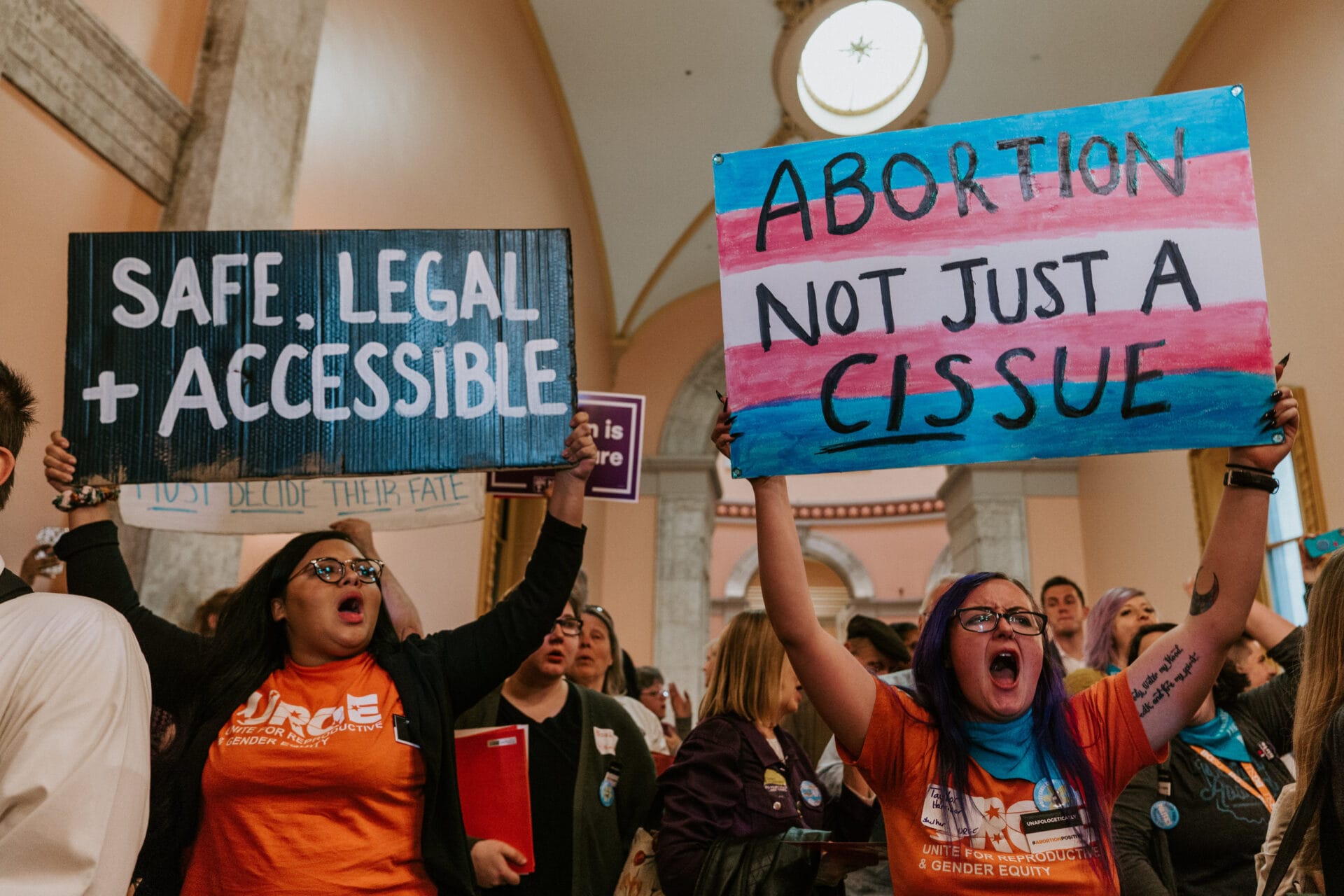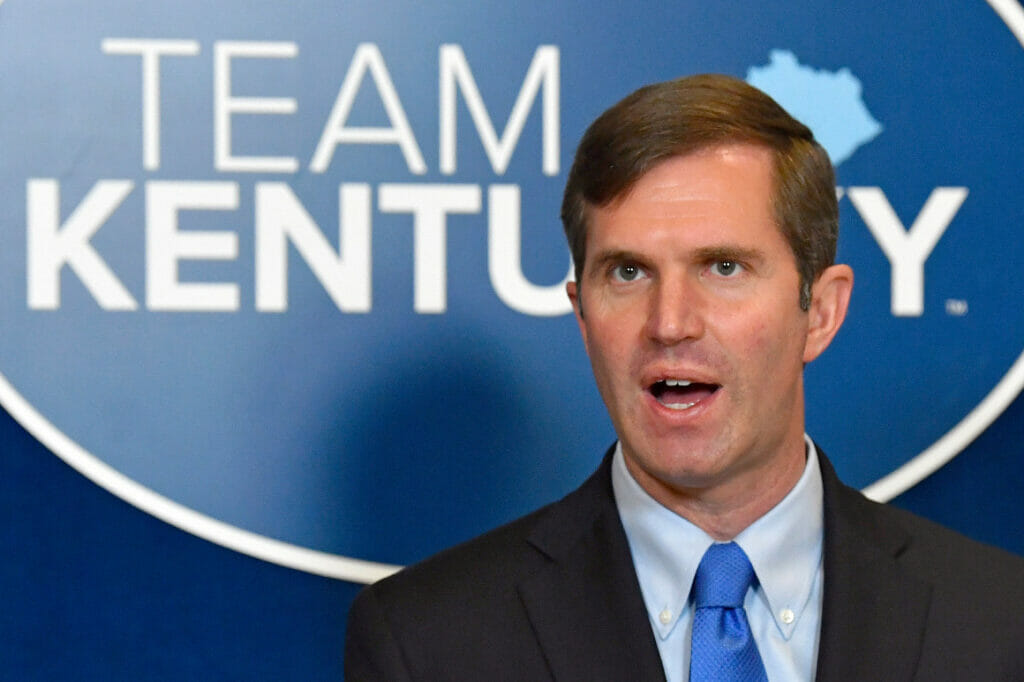As the election returns came in from Virginia, Kentucky, and Ohio one week ago, a picture of victory became clear. Voters in those states marked their ballots in favor of pro-equality candidates and issues, and their choices advances LGBTQ equality and representation. And another image emerged as well—that of the failure of anti-transgender rhetoric in campaigns.
“Voters for LGBTQ equality and everyone’s fundamental freedoms came out in force in the 2023 election, reflecting the reality that a supermajority of Americans support LGBTQ people and our right not to be discriminated against,” said GLAAD President and CEO, Sarah Kate Ellis. “The results will lead to a better lived reality for LGBTQ people in the South and Midwest, and send a message to all lawmakers: LGBTQ people are valued members of our communities, we value everyone’s freedom to be themselves and make their own health care decisions, and we embrace diversity in our elected officials.”
Governor Andy Beshear (above) was re-elected in Kentucky, defeating opponent Daniel Cameron who made opposition to transgender rights a focus of his campaign, while trans kids are a tiny portion of the state’s youth population (approximately 0.7% of Kentucky’s ages 13-17 population). Multiple times in a debate Cameron inaccurately referred to transgender student athletes by calling them “biological boys” and his campaign for governor ran false and inflammatory ads that describe a “radical transgender agenda.” Cameron falsely called health care for transgender youth “child mutilation.” Every major medical association supports health care for transgender people and youth.
Cameron’s text messaging campaign attacking trans youth failed to secure a win, and at the end of the campaign, some of Cameron’s conservative colleagues questioned the effectiveness of an anti-transgender focus. Instead Kentucky voters chose Beshear who, in his first term as governor, vetoed anti-transgender bills passed by extremists in the legislature (it was overridden by a conservative supermajority and passed into law; Kentucky was one of at least 17 states during their most recent legislative sessions to enact restrictions on health care for trans people).
Cameron’s LGBTQ record is here, and Gov. Beshear’s LGBTQ record is here.
Reproductive freedom was at stake in multiple states. The topic was on the ballot directly in Ohio, where voters chose to enshrine the right to reproductive health care into the state constitution. And abortion was on the ballot indirectly in Virginia where voters gave control of both legislative bodies to Democrats who oppose Governor Glenn Youngkin’s position. Youngkin made his proposed 15-week abortion ban central to his campaign to help Republicans gain control of both chambers of the state’s General Assembly, but the post-election balance of power now means a 15-week or stricter abortion ban will likely not emerge from those bodies for Youngkin’s signature. Voters in seven consecutive states have now expanded access to reproductive freedom since Roe v. Wade was overturned last year. See Youngkin’s LGBTQ record here.

Conservative messaging may have catapulted Youngkin to a 2021 win over Terry McAuliffe, a former Democratic governor, with campaign messaging opposing “critical race theory” (often code for opposition to diversity in representation in education) and supporting so-called “parents’ rights” (a misleading term: “Parents’ rights” as advanced by anti-LGBTQ groups like Moms for Liberty do not include the rights of LGBTQ parents, parents of LGBTQ children, ally parents who also want accurate and inclusive education for their children, and parents from communities of color). But there is evidence that voters rejected anti-equality messaging, as seen in Kentucky and Virginia, as well as the elections of LGBTQ notable firsts including Mississippi, which elected its first out gay lawmaker to the state legislature, Fabian Nelson; Rhode Island which elected Gabe Amo, the first Black man to represent Rhode Island in Congress, succeeding out LGBTQ Rep. David Cicilline; and Philadelphia which elected its first woman as mayor, Cherelle Parker, and its first out LGBTQ person to city council, Rue Landau. And in Virginia, voters elected the South’s first transgender state senator, Danica Roem. The LGBTQ Victory Fund reported that nine out LGBTQ candidates won in Virginia, among 238 out candidates who won nationwide in 2023, surpassing the record 185 who won in 2021.
View this post on Instagram
The failure of anti-equality campaigning is also evident in the rejection of the majority of Moms for Liberty-endorsed candidates in school board elections around the country. The organization, designated an “extremist group” by the Southern Poverty Law Center (SPLC), lost in high-profile school board elections in Pennsylvania, Virginia, and Ohio. Progressive candidates actually flipped M4L-controlled boards in Pennsylvania’s Central Bucks and Pennridge school districts—two big wins that came out of grassroots counter-activism from outraged parents in these communities.
Pro-equality candidates still face uphill battles in parts of the country. In the high-profile Mississippi’s governor’s race, Tate Reeves was re-elected to a second term, defeating challenger Brandon Presley. Reeves’s anti-LGBTQ record includes signing into law the baselessly-named “Regulate Experimental Adolescent Procedures (REAP) Act” which prohibits minors from accessing transgender health care. After he signed the bill, Reeves invited virulently anti-LGBTQ commentator Matt Walsh to speak, and Walsh reiterated multiple lies about the nature of transgender healthcare, and called it “butchery.” Reeves also signed the so-called “Mississippi Fairness Act” into law, requiring the state’s schools to designate teams by sex assigned at birth and prohibiting transgender student athletes from participating in school sports in alignment with their gender identity. He has multiple times tweeted baseless attacks on trans youth athletes and trans health care.
Mississippi voters are confronted with limited opportunities to vote, when compared with many other Americans, and saw long lines in the state capital of Jackson as polling sites ran out of ballots on the only day the state allows voting. Mississippi does not have an early voting period, and state legislators recently passed a law restricting the assistance that can be provided to voters with disabilities or who do not have the ability to read or write (the law was struck down as unconstitutional). And until another recent court order, Mississippi did not allow former felons who had completed their sentences to regain the right to vote.
“LGBTQ voters and our allies must continue to use the power of their voice and votes for equality and a more just and prosperous country,” GLAAD’s Sarah Kate Ellis urged. “We must build on the momentum from the 2023 elections for the consequential elections of 2024—we can’t wait.”
Additional research:
- GLAAD: A supermajority (91%) of non-LGBTQ Americans agree that LGBTQ people should have the freedom to live their life and not be discriminated against.
- In 2023, state lawmakers introduced a record 500+ bills targeting LGBTQ people and youth and their access to essential health care, school sports, inclusive curriculum and books.
- Anti-LGBTQ lawmakers in Virginia proposed more than two dozen bills directly targeting LGBTQ people, in particular, transgender Virginians. Of the 12 anti-transgender-related bills introduced, all were defeated.
- Although the overwhelming majority of bills introduced across the country failed to advance or become law, anti-LGBTQ rhetoric from elected officials and in the public square continues to cause real-world harm, per the Trevor Project’s 2022 National Survey on LGBTQ Youth Mental Health.
- Before 2020, no state had ever introduced legislation to ban health care for transgender Americans, which has been safely prescribed for decades and has the support of every major medical association and leading health authority. Statements from 30+ medical associations in support of transgender health care are available here.
- Drag bans have now been struck down in multiple states including Tennessee, Florida, Montana and Texas. GLAAD has documented at least 160 incidents of violence and threats against drag performances across the country.
- Book bans have proliferated in schools and communities, most targeting books by and about LGBTQ people, and books about race and racism. 78% of Americans say they would be less likely to support candidates who back book bans. Moms for Liberty, an anti-LGBTQ extremist group that bills itself as a so-called “parental rights” organization, is a driving force behind book challenges.
- ADL’s Center on Extremism and GLAAD have documented more than 500 incidents of violence, harassment, and vandalism since June 2022.













